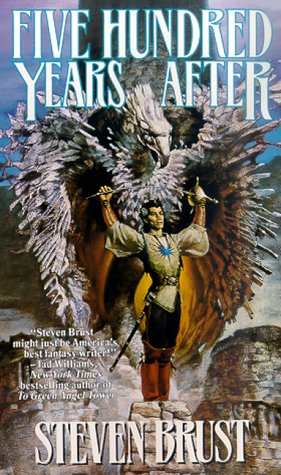Five Hundred Years After is a direct sequel to The Phoenix Guards but the interesting thing about it is what a different kind of book it is. The Phoenix Guards is an unabashed romp, this is quite a serious novel—after all it is the story of something known to history as “Adron’s Disaster.” As The Phoenix Guards is very loosely based on The Three Musketeers, this is even more loosely based on the sequel, Twenty Years After. But while The Phoenix Guards is about equally rooted in Dumas and Dragaera, this is much more a work of Dragaeran historical fiction, and a kind of meta-commentary on the whole concept of historical fiction.
It is a commonplace for a historical novel to deal with an event with which the readers are familiar. Readers may not know the details of the French Revolution, or the Civil War, but when they pick up a novel about it they’ll know at least that heads will be lost by, on the one hand aristocrats, and on the other King Charles. It’s possible for the writer to use that knowledge to draw upon historical irony to underline the story. It’s a very unusual thing for a fantasy novel to do, because the reader doesn’t have that background—usually in genre fiction the writer has to feed the reader the context along with the story. Brust gets away with it here because we’ve been hearing about Adron’s Disaster since Jhereg, and anyone who has read the books up to this point does know of the event in general outline. I have no idea what Five Hundred Years After would look like to someone who hadn’t read the Vlad books. I wanted to read it as soon as I’d finished The Phoenix Guards, but Emmet (who, you may remember, vastly prefers reading in publication order) absolutely insisted that I had to have read at least Jhereg first. I think it would have been a very different experience, and I’d like to hear from anyone who did this—but what I wouldn’t have had is the interesting experience of historical inevitability informing a fantasy novel.
All of the ingredients of The Phoenix Guards are here, but the tone is much less carefree. For much of the book Khaavren is lonely and alone, he is only united with all his friends at once at the end. There’s a feeling of inevitable doom hanging over everything, until at last doom strikes.
In a flash, in an instant, all were gone, as was the Palace and all the landmarks and buildings by which the city was known and for which it was loved, as well as those others, all but unknown yet landmarks in their own way—the Silver Exchange, the Nine Bridges Canal, Pamlar University, the nameless cabaret in the Underside where Lord Garland had conspired with his daughter, the equally nameless inn where, upon entering the Guard five hundred years before, Khaavren had killed a man named Frai. All of these were now gone forever, preserved only in the memories of those who had seen them, or in such works of art as happened to depict them—of all the buildings and artifacts by which the city was known, only the Orb itself was preserved.
The Phoenix Guards is a comedy and Five Hundred Years After is a tragedy—yet it’s a tragedy told in comic mode. Paarfi remains as funny as ever, with his asides and manner of speech. The inimitable banter is as good as ever. Khaavren finds true love, and all the friends miraculously escape the calamity. Of all of this I’m least satisfied with the romance; it is (as Paarfi acknowledges) perfunctory—when all the other characterisation is so good, Daro remains a cypher. I also find the villains less interesting than in The Phoenix Guards.
Of course Paarfi contradicts some of what we thought we knew about Adron’s Disaster, and gives us another angle on it entirely. That Aliera and the almost mythical Mario should be having a relationship is news, and the way the disaster came about isn’t at all what Aliera told Vlad in Jhereg. Aliera wouldn’t have talked to Paarfi—but he’s undoubtedly right about all the checkable details.
Paarfi wrote this several years after the events of the Vlad novels as we have them, in the reign of Norathar. He was writing as early as the time of Phoenix, because Cawti reads one of his romances. He therefore lives after the Interregnum, at a time when sorcery is vastly more powerful, teleporting others or oneself is common, and telepathic communication is trivial. It’s strange that he writes about Sethra’s teleport as something astonishing and unheard of and as if he’s expecting his readers to be astonished by it. David Goldfarb suggests in the Phoenix Guards thread:
I have a strong suspicion that magic wasn’t quite so difficult nor rare during this period as Paarfi portrays it. I think Paarfi doesn’t like magic, and rewrites his histories to downplay it.
That would explain a lot.
Jo Walton is a science fiction and fantasy writer. She’s published eight novels, most recently Half a Crown and Lifelode, and two poetry collections. She reads a lot, and blogs about it here regularly. She comes from Wales but lives in Montreal where the food and books are more varied.










